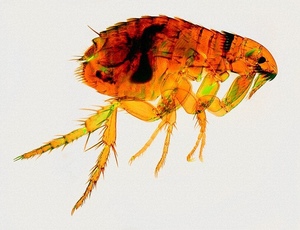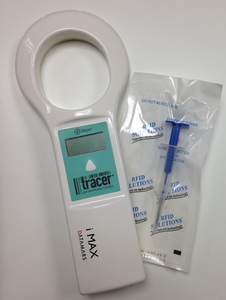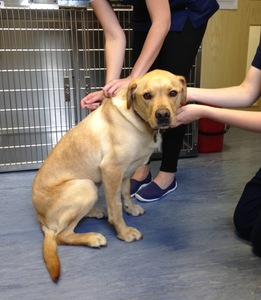Preventative Health care for your pet.
Many of the health problems and conditions that affect our pets can be prevented with preventative health care. Here at Hollybank Veterinary Centre we believe that prevention is the best kind of medicine.
Fleas and worms
 These parasites can be picked up from anywhere and many of our pets can have them without us even realising. Fleas can be a problem in the cleanest of houses and the most spotless of pets, just one flea can lay up to 40-50 eggs in one day! 95% of the flea population actually lives in the environment, such as carpets, grass or furniture. Fleas can survive at all times of the year, but mostly during the warmer seasons such as Spring, Summer and Autumn. However, dormant larvae in carpets will also start to develop when the central heating kicks in come Winter.
These parasites can be picked up from anywhere and many of our pets can have them without us even realising. Fleas can be a problem in the cleanest of houses and the most spotless of pets, just one flea can lay up to 40-50 eggs in one day! 95% of the flea population actually lives in the environment, such as carpets, grass or furniture. Fleas can survive at all times of the year, but mostly during the warmer seasons such as Spring, Summer and Autumn. However, dormant larvae in carpets will also start to develop when the central heating kicks in come Winter.
There are many different types of worms that affect our pets, including tapeworms, roundworms and lungworms. Some of these worms are also ‘zoonotic’ which means they can be passed from our pets on to us. Our pets are often infected from the environment (infected faeces or grass) or from other infected animals.
It is essential to keep your pets regularly treated for fleas and worms to prevent an outbreak. It is also important to treat the environment. When selecting appropriate treatment please read the packaging carefully. Ensure the product is specific to the species you are treating and adhere to the correct dosing quantity and frequency. If you have any questions regarding flea or worming treatment please contact the practice.
Microchipping
 As of April 2016, England will be introducing a new law which requires all dogs to be microchipped. A microchip is a small electronic device, about the size of a grain of rice. The chip is inserted under the animal’s skin, usually between the shoulder blades. The procedure does not require an anaesthetic and the microchip is injected using a needle. This means that if your pet is lost or stolen and taken to a local authority, vet practice or animal welfare organisation, your details can be traced using the microchip. This will allow you to be re-united with your pet.
As of April 2016, England will be introducing a new law which requires all dogs to be microchipped. A microchip is a small electronic device, about the size of a grain of rice. The chip is inserted under the animal’s skin, usually between the shoulder blades. The procedure does not require an anaesthetic and the microchip is injected using a needle. This means that if your pet is lost or stolen and taken to a local authority, vet practice or animal welfare organisation, your details can be traced using the microchip. This will allow you to be re-united with your pet.
Vaccinations
 Dogs, cats and rabbits can all be vaccinated against a wide range of diseases. These diseases cannot only make your animal unwell, but can in fact be fatal. Vaccinating your pet can significantly reduce the risk of your pets contracting these diseases.
Dogs, cats and rabbits can all be vaccinated against a wide range of diseases. These diseases cannot only make your animal unwell, but can in fact be fatal. Vaccinating your pet can significantly reduce the risk of your pets contracting these diseases.
Routinely dogs are vaccinated against Distemper virus, Parvovirus, Infectious Canine Hepatitis and Leptospirosis. Cats are protected against Panleucopenia virus, Herpesvirus, Calicivirus and Feline Leukaemia virus. Finally, rabbit’s vaccinations are against diseases such Myxomatosis and Viral Haemorrhagic Disease (VHD).
If you would like to start your pets vaccinations, think your pets annual vaccination is overdue or have any questions regarding vaccinations, please contact the practice.
Neutering
Neutering your pet not only prevents unwanted pregnancies, but also provides a number of significant health benefits for your pet.
For females it also reduces the risk of them experiencing false pregnancies as well as decreasing the risk of uterine and ovarian cancer, uterine infections and mammary cancer. For males it reduces roaming, fighting and urine marking, as well as reducing the risk of testicular diseases (cancer, infection, torsion) and prostatic diseases (enlargement, infection, cancer).
Neutering is a surgical operation which requires a general anaesthetic. Your animal will come in for the procedure in the morning and will usually go home the same day. The initial recovery period requires strict rest for 5 days. Your pet will also go home with additional pain relief and a very attractive buster collar to prevent them interfering with their wound. The age at which your pet can be neutered varies according to size and shape. In general dogs can be neutered from 4-5 months, cats from 4 months and rabbits from 3-4 months.
If you have any questions regarding preventative health care please contact us on 01606 880 890.
